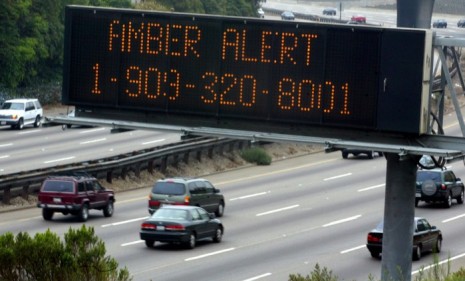Can Facebook help find missing kids?
As Facebook starts issuing AMBER Alerts about missing children, experts hope the site's expansive reach will help reunite more families

A free daily email with the biggest news stories of the day – and the best features from TheWeek.com
You are now subscribed
Your newsletter sign-up was successful
Facebook announced on Wednesday that its users will be able to receive Amber Alerts, the public service announcements that are issued when a child goes missing in North America — and which have led to the recovery of 525 kids since 1995. In collaboration with the Justice Department and the National Center for Missing and Exploited Children, the social media site will let users customize their Amber Alert feeds to avoid being inundated with info. The timing of the Facebook announcement has symbolic importance, says the Los Angeles Times. "The launch takes place on the 15th anniversary of the abduction and murder of 9-year-old Amber Hagerman, for whom the alert system was named." (Watch a local report about Facebook's Amber Alerts.) Here's a brief guide to the new initiative:
How will this work?
The site has set up 53 profile pages — one for each state plus Puerto Rico, Guam, and the Virgin Islands — and "users who become a fan will immediately get alerts in their news feed when there is a missing child in their area," says The Wall Street Journal. Users can also add Amber Alert widgets, which update every 10 minutes, to their Facebook wall. They also have the option to post alerts to their news feed, send them to friends, and use their status updates to broadcast the information, according to Facebook.
The Week
Escape your echo chamber. Get the facts behind the news, plus analysis from multiple perspectives.

Sign up for The Week's Free Newsletters
From our morning news briefing to a weekly Good News Newsletter, get the best of The Week delivered directly to your inbox.
From our morning news briefing to a weekly Good News Newsletter, get the best of The Week delivered directly to your inbox.
Will this help find more kids?
The Amber Alert success rate is already high — between 2005 to 2009, 98.5 percent of the children featured were recovered. But experiments with Facebook have been extremely promising. When a 12-year-old Virginia girl was abducted six weeks ago, reports MSNBC, the state police posted an Amber Alert on Facebook. The link went viral, the story became national news, and "five days later, on the other side of the country, a woman spotted the missing [girl] outside a store in San Francisco." A police superintendent told reporters that "social media certainly enabled law enforcement to reach beyond our borders."
What does this say about social media?
That it's becoming a place for important news, not just frivolous gossip. This is yet "another sign that web services like Facebook and Twitter are becoming the fastest ways to disseminate information to the largest number of people," says Josh Constine at Inside Facebook. The social-networking giant's role in distributing this kind of information could pave the way for the site to become "a medium for disseminating other types of emergency information, such as warnings about natural disasters, product recalls, violent crime, and national security."
A free daily email with the biggest news stories of the day – and the best features from TheWeek.com
Sources: Facebook, Inside Facebook, MSNBC, USA Today, Wall Street Journal
-
 Film reviews: ‘Send Help’ and ‘Private Life’
Film reviews: ‘Send Help’ and ‘Private Life’Feature An office doormat is stranded alone with her awful boss and a frazzled therapist turns amateur murder investigator
-
 Movies to watch in February
Movies to watch in Februarythe week recommends Time travelers, multiverse hoppers and an Iraqi parable highlight this month’s offerings during the depths of winter
-
 ICE’s facial scanning is the tip of the surveillance iceberg
ICE’s facial scanning is the tip of the surveillance icebergIN THE SPOTLIGHT Federal troops are increasingly turning to high-tech tracking tools that push the boundaries of personal privacy